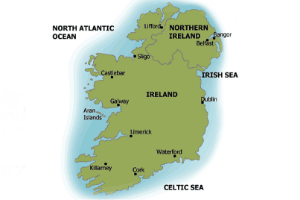Ontario Tech professor co-authors book on how online tools can help reduce prejudice
June 28, 2013

Online tools are a key ingredient for helping children from communities in conflict overcome prejudice, according to a new book co-authored by an Ontario Tech University faculty member and a researcher in Northern Ireland.
Dr. Bill Hunter, Professor in Ontario Tech's Faculty of Education, collaborated with Roger Austin, Professor at the University of Ulster in Northern Ireland to write the book Online Communication and Community Cohesion: School Links. Published on June 27 by Routledge, the book examines international initiatives that use online technologies to bring children together from communities in conflict to work on collaborative school projects.
Dr. Hunter first became interested in the use of information communications technology (ICT) as a way to address social isolation when he was co-ordinating distance learning programs at the University of Calgary between 2000 and 2002.
“What struck me then was that technology was kind of anti-distance-learning: it was bringing people into the classroom together from diverse places,” he said.

Dr. Bill Hunter, Professor in Ontario Tech's Faculty of Education.
When Dr. Hunter took his sabbatical leave from 2007 to 2008, he returned to his birthplace, Northern Ireland, to seek out other researchers who were interested in the same ideas. There he found Dr. Austin, who was running the Dissolving Boundaries Project, a program that uses ICT to facilitate cross-cultural educational links between schools in the Northern Ireland and the Republic of Ireland, and is jointly funded by the two governments. Teachers team up children from both countries to work on online math, biology and social studies projects, with the goal of improving relationships between the two groups.
Hunter and Austin began looking at international policies in ICT, which led them to examine what was happening in Canada—particularly Newfoundland—as well as the U.S. They found programs in Israel based on the Dissolving Boundaries Project, as well as a massive eTwinning project in Europe, which provides support, tools and services for teaching staff in participating countries to communicate, collaborate, develop projects and share resources.
“Ultimately, we wanted to compare and contrast all these things to see whether there were lessons to be learned,” Dr. Hunter said.
Through their research, Hunter and Austin learned that when teachers are given the opportunity and support necessary to develop collaborative educational projects that transcend social, ethnic and religious divisions, “the children embrace the challenge of working together and they not only learn the content of the curriculum, but also the essential humanity of people who seem different from them,” he said.
 Dr. Roger Austin, Professor of Education, University of Ulster, Northern Ireland.
Dr. Roger Austin, Professor of Education, University of Ulster, Northern Ireland.The online collaborative ideas explored in the book are based on Gordon W. Allport’s contact hypothesis, which argues that increased contact between members of different groups reduces prejudice between those groups.
“What excites me about this research is the possibility that over time we will learn how to use technologies to reduce the tensions between different groups of people: how to build stronger, better political communities as a consequence of children learning to get along with people who are, in their parents’ eyes, too dangerous and too difficult to communicate with,” he said.
While improvements have already been realized in Europe, Israel and in Northern Ireland and the Republic of Ireland, social isolation has not been addressed with technology to the same extent in Canada or the U.S., partially because of other face-to-face methods that have taken precedence, such as desegregation in public schools in the U.S., and the reliance on multiculturalism policies in Canada.
“We would like to see these technologies used more in the United States and in Canada,” he said. The key is to find interested teachers who are prepared to make a commitment, and give them access to the appropriate technologies, services and support as well as examples of successful projects.
It’s difficult to say how long it will take for online collaboration to break down prejudicial barriers. In England, for example, there have been considerable reductions in race-based riots and violence over the last 10 years. In addition, “we have seen kids in Northern Ireland and the Republic of Ireland come to refer to one another as friends as a result of their projects together,” he said.
However, in Israel, things will probably progress more slowly because of parents’ concerns about violence, and because of cultural and religious dictates that prevent children from being educated with others who are of a different religion or gender. “We see the possibility for considerable change over half a generation, but it’s not possible to say how long it will take for that change to happen in any global way,” said Dr. Hunter.
Read an overview and chapter summaries of Online Communication and Community Cohesion: School Links.



